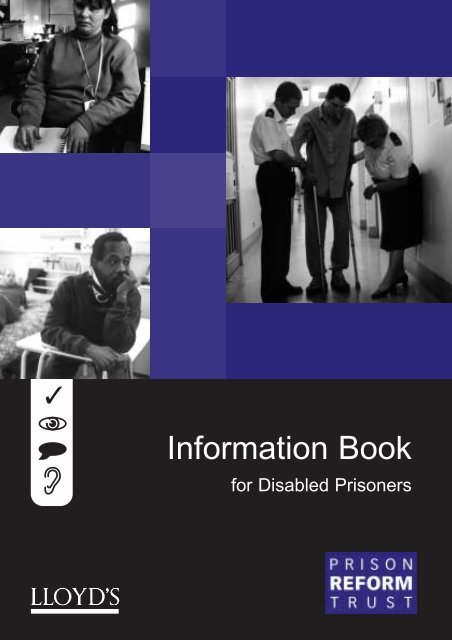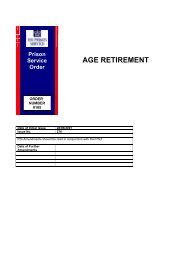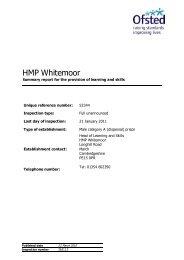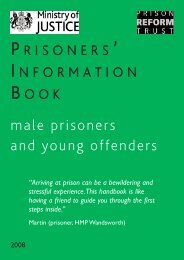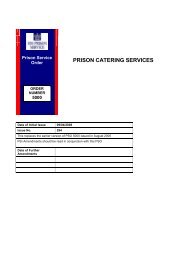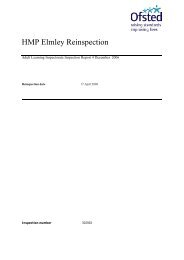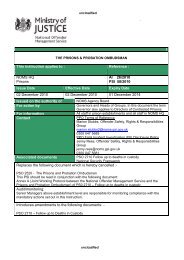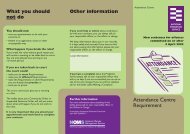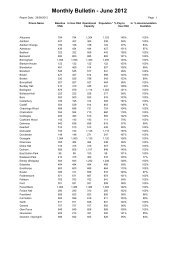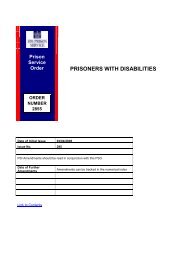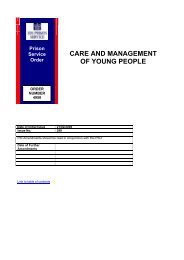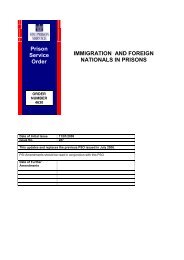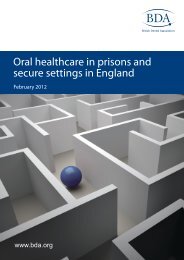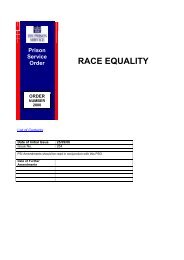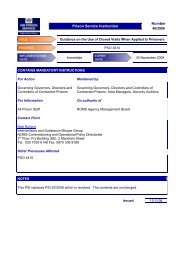Information Book for Disabled Prisoners - Inside Time
Information Book for Disabled Prisoners - Inside Time
Information Book for Disabled Prisoners - Inside Time
Create successful ePaper yourself
Turn your PDF publications into a flip-book with our unique Google optimized e-Paper software.
<strong>In<strong>for</strong>mation</strong> <strong>Book</strong><br />
<strong>for</strong> <strong>Disabled</strong> <strong>Prisoners</strong>
The work of the Prison Re<strong>for</strong>m Trust<br />
is aimed at creating a just, humane<br />
and effective penal system. We do<br />
this by inquiring into the workings<br />
of the system; in<strong>for</strong>ming prisoners,<br />
staff and the wider public; and by<br />
influencing Parliament, Government<br />
and officials towards re<strong>for</strong>m.<br />
© 2004: Prison Re<strong>for</strong>m Trust<br />
All rights reserved. No part of this publication may be reproduced or transmitted, in any <strong>for</strong>m<br />
or by any means, electronic, mechanical, photocopying, recording or otherwise without the<br />
prior permission of the copyright owners.<br />
First published in 2004 by Prison Re<strong>for</strong>m Trust<br />
15 Northburgh Street, London EC1V 0JR<br />
www.prisonre<strong>for</strong>mtrust.org.uk<br />
Cover photos by Robert Taylor, Jason Shenai and Michael Grieve<br />
Designed by Clinton Smith 020 7267 7727
Further in<strong>for</strong>mation and advice<br />
Terrence Higgins Trust<br />
020 7831 0330 www.tht.org.uk<br />
THT is the leading HIV & AIDS charity in the UK and the<br />
largest in Europe. The request service, which is run by trained<br />
volunteers, covers a wide range of topics relating to HIV. It can<br />
provide THT publications and briefing sheets, answer queries<br />
and help to direct people to other sources of in<strong>for</strong>mation.<br />
52-54 Grays Inn Road Helpline: 0845 1221200<br />
London Fax: 020 7242 0121<br />
WC1X 8JU E-mail: info@tht.org.uk<br />
Acknowledgements:<br />
Many thanks to the following individuals and groups who helped us compile this booklet:<br />
35<br />
Liz Prior, Jeanne Whitaker and Paul Norman at Prison Service HQ, Fred Bayliss &<br />
Joanne D’Oyly HMP Staf<strong>for</strong>d Disability Liaison Team, and Jason Parkington, DLO<br />
at HMP Preston. Staff & <strong>Prisoners</strong> at HMPs Staf<strong>for</strong>d, Durham, Lindholme, Wymott,<br />
Low Newton, Leyhill and Stocken; Also Ken & June Roberts of CIL, Llangefni,<br />
Anglesey who provided assistance to Jenny Parry, who wrote this booklet.<br />
The Prison Re<strong>for</strong>m Trust wishes to thank Jenny Parry <strong>for</strong> her hard work in<br />
compiling this booklet and Lloyd’s Charities Trust <strong>for</strong> supporting the entire project.
34<br />
Further in<strong>for</strong>mation and advice<br />
The Sickle Cell Society<br />
020 8961 7795/4006 www.sicklecellsociety.org<br />
The Sickle Cell Society is a national charity with around 2,000<br />
members. It offers support by contact with other sufferers<br />
where possible. It publishes a quarterly newsletter and<br />
provides printed in<strong>for</strong>mation.<br />
54 Station Road, Fax 020 8961 8346<br />
London NW10 4UA E-mail: info@sicklecellsociety.org<br />
Spinal Injuries Association<br />
020 8444 2121 www.spinal.co.uk<br />
SIA provides a resource centre, freephone in<strong>for</strong>mation and<br />
advice on a wide range of issues. It publishes ‘Moving Further<br />
Forward’ – a manual on living with spinal injury, and a<br />
bi-monthly newsletter ‘Forward’.<br />
SIA, 76 St James's Lane, Freephone 0800 980 0501<br />
London N10 3DF Voice/Fax: 0800 980 0501<br />
E-mail: info@sisonline.org<br />
The Stroke Association<br />
020 7566 0300 www.stroke.org.uk<br />
The Stroke Association provides advice and in<strong>for</strong>mation on<br />
stroke illness. It has a free quarterly magazine ‘Stroke News’,<br />
and a number of leaflets and publications covering many<br />
aspects of strokes.<br />
Stroke House, Helpline: 0845 3033100<br />
240 City Road, Fax: 020 7490 2686<br />
London EC1V 2PR E-mail: stroke@stroke.org.uk
This booklet will provide you with:<br />
> general help and advice<br />
> in<strong>for</strong>mation on your rights<br />
and benefits<br />
> details of how you can keep in touch<br />
with family and friends<br />
> in<strong>for</strong>mation on helpful organisations<br />
and support<br />
The Disability Liaison Officer<br />
(DLO) at this establishment is:
Contents<br />
01 Introduction<br />
02 When you first arrive in prison<br />
03 Induction – your introduction to the prison<br />
05 Welfare Benefits<br />
07 Disability and Prison life<br />
How will disability affect you whilst in prison?<br />
08 Who can Help?<br />
Disability Liaison Officer<br />
Listeners or Buddies<br />
11 Requests and Complaints<br />
Prisons and Probation Ombudsman<br />
13 Your Rights<br />
The Disability Discrimination Act (1995)<br />
16 Prison Service Orders<br />
18 Keeping in Touch<br />
20 Your Release<br />
Resettlement and Release<br />
22 Further in<strong>for</strong>mation and advice
Further in<strong>for</strong>mation and advice<br />
RNID (Royal National Institute <strong>for</strong> Deaf People)<br />
Freephone 0808 808 0123 www.rnid.org.uk<br />
Scope - Cerebral Palsy Helpline<br />
Freephone 0808 800 3333 www.scope.org.uk<br />
33<br />
The RNID is the largest charity representing the 8.7 million<br />
deaf and hard of hearing people in the UK. Services include<br />
in<strong>for</strong>mation, awareness training, campaigning, residential care,<br />
communication services, employment services, telephone relay<br />
service (Typetalk), and a Tinnitus Helpline. It has a casework<br />
service <strong>for</strong> people who feel they may have been discriminated<br />
against under the DDA.<br />
19-23 Featherstone St, Freephone Textphone: 0808 808 9000<br />
London Freephone helpline: 0808 808 0123<br />
EC1Y 8SL Fax: 020 7296 8199<br />
Tinnitus helpline: 0808 808 6666<br />
Tinnitus textphone: 0808 808 0007<br />
E-mail: helpline@rnid.org.uk<br />
Scope is a national disability charity which focuses on cerebral<br />
palsy. Its aim is <strong>for</strong> all disabled people to achieve equality.<br />
The Helpline is open from 9am–9pm weekdays and 2pm–6pm<br />
weekends and Bank Holidays. In-depth in<strong>for</strong>mation and advice<br />
is provided on all aspects of cerebral palsy and disability<br />
issues. A team of trained counsellors provides clients with<br />
emotional support and initial counselling.<br />
P.O. Box 833, Fax: 01908 321051<br />
Milton Keynes MK12 5NY E-Mail: cphelpline@scope.org.uk
32<br />
Further in<strong>for</strong>mation and advice<br />
Ricability<br />
020 7427 2460 www.ricability.org.uk<br />
Ricability is an independent charity also known as RICA<br />
(Research Institute <strong>for</strong> Consumer Affairs). It carries out<br />
research and publishes unbiased consumer in<strong>for</strong>mation on<br />
products and services to enable older and disabled people to<br />
live more independently. It has produced consumer guides<br />
which advise on products <strong>for</strong> people who have limited mobility,<br />
poor grip, poor sight or are hard of hearing.<br />
30 Angel Gate, Fax: 020 7427 2468<br />
City Road, Textphone: 020 7427 2469<br />
London E-mail: mail@ricability.org.uk<br />
EC1V 2PT<br />
RNIB (Royal National Institute of the Blind)<br />
020 7388 1266 www.rnib.org.uk<br />
RNIB Helpline <strong>for</strong> in<strong>for</strong>mation, support and advice about sight<br />
problems (open 9-5 Monday to Friday) Tel: 0845 766 9999<br />
105 Judd Street, E-mail: helpline@rnib.org.uk<br />
London<br />
WC1H 9NE
Introduction<br />
Why a booklet?<br />
There are many people in prisons throughout the UK who have<br />
a <strong>for</strong>m of disability. Some of these disabilities are instantly<br />
recognisable, some are not as obvious, yet are<br />
equally important. There has been little<br />
in<strong>for</strong>mation aimed at prisoners with<br />
disabilities up until now, so we hope<br />
you will find that this booklet gives<br />
you the in<strong>for</strong>mation you need or<br />
points you in the right direction.<br />
Be<strong>for</strong>e printing the booklet we<br />
discussed it with groups of prisoners and<br />
prison staff at several prisons, and with disability groups within<br />
the community, to make sure the contents were useful and<br />
correct. We decided that a booklet, which would be given to<br />
you as soon as possible when you first came into prison, was<br />
the best way to give you the in<strong>for</strong>mation you might need.<br />
If you do find any gaps or mistakes please contact us at the<br />
address on the back cover and we will do our best to make<br />
changes in any future editions.<br />
Audio Tape<br />
If reading is difficult <strong>for</strong> whatever reason<br />
an audio tape is also available. Ask at<br />
your Wing Office <strong>for</strong> a copy or speak to the<br />
Disability Liaison Officer about how to get one.<br />
1
2<br />
Arrival<br />
When you first arrive in prison<br />
When you first arrive in prison you will go through reception.<br />
This is a good time <strong>for</strong> you to tell a member of staff about a<br />
disability. Any in<strong>for</strong>mation about you is confidential and should<br />
not go any further. If you have been transferred from another<br />
prison please in<strong>for</strong>m staff about your disability even if you think<br />
they should already know.<br />
Everybody who comes into prison will be seen by a<br />
doctor and this will give you the opportunity<br />
to discuss any health issues or<br />
disabilities. This is an ideal time <strong>for</strong><br />
you to tell them any worries you may<br />
have about specific conditions, and<br />
about any medication you may be<br />
taking. Remember, they will only<br />
know what you tell them.<br />
During reception or induction (see below) prisoners are usually<br />
given an ‘Induction Pack’. According to Prison<br />
Service Order (PSO) 0550 all prisoners<br />
must receive in<strong>for</strong>mation about the<br />
prison they are in, the prison rules,<br />
and what to do in emergency<br />
situations. If you did not receive this<br />
when you first came into prison, ask<br />
at your wing office <strong>for</strong> one.
Further in<strong>for</strong>mation and advice<br />
Multiple Sclerosis Society<br />
National Asthma Campaign<br />
020 7226 2260 www.asthma.org.uk<br />
The Asthma Helpline can give you independent, up-to-date<br />
advice on living with asthma.<br />
National Asthma Campaign, Helpline: 0845 701 0203<br />
Providence House, Fax: 020 7704 0740<br />
Providence Place,<br />
London<br />
N1 0NT<br />
31<br />
Freephone 0808 800 8000 www.mssociety.org.uk<br />
The MS Helpline offers in<strong>for</strong>mation and support <strong>for</strong> people with<br />
MS, their friends, families and carers, Mon-Fri, 9am - 9pm.<br />
MS National Centre, E-mail: Info@mssociety.org.uk<br />
372 Edgware Road,<br />
London<br />
NW2 6ND
30<br />
Further in<strong>for</strong>mation and advice<br />
Limbless Association<br />
020 8788 1777 www.limbless-association.org<br />
The Limbless Association provides in<strong>for</strong>mation, advice and<br />
support <strong>for</strong> people of all ages who are without one or more limbs.<br />
Rehabilitation Centre, Fax: 020 8788 3444<br />
Roehampton Lane, E-mail:<br />
London enquiries@limbless-association.org<br />
SW15 5PR<br />
Mind<br />
020 8519 2122 www.mind.org.uk<br />
Mind is the main mental health charity in England and Wales.<br />
It works to create a better life <strong>for</strong> everyone with experience of<br />
mental distress. The Mind info Line offers callers confidential help<br />
on a range of mental health issues. Call 0845 766 0163 from<br />
anywhere in the UK <strong>for</strong> the price of a local call. It also provides a<br />
legal service to the public, lawyers and mental health workers.<br />
15-19 Broadway, Mind Info Line: 0845 766 0163<br />
London Fax: 020 8522 1725<br />
E15 4BQ E-mail: contact@mind.org.uk
Induction<br />
Induction - your introduction to the prison<br />
‘Induction’ is the process that takes place after reception, and<br />
be<strong>for</strong>e most people move into the main prison, and is where<br />
you are told all about the prison. This may not take place<br />
straight away and you may stay in the Health Care Centre<br />
during your induction. Depending on the nature of your<br />
disability, you may stay in the Health Care Centre <strong>for</strong> your<br />
whole period at a prison if there are no adapted cells.<br />
Don’t <strong>for</strong>get though, that wherever you are in the prison you<br />
should have the same opportunity to take part in education,<br />
work, programmes, religion, exercise and so on, as any other<br />
prisoner. If the prison design and layout makes access to<br />
these parts of prison life difficult or impossible <strong>for</strong> you, you<br />
need to see if prison staff can help you gain access in another<br />
way.<br />
If you have sight impairment or are deaf or have hearing<br />
problems, the prison has to provide help so you can<br />
communicate. For example, it should be able to provide a<br />
personal reader, or in<strong>for</strong>mation in Braille,<br />
large print or on tape <strong>for</strong> giving you<br />
important in<strong>for</strong>mation. If you have<br />
dyslexia, you may be able to get<br />
in<strong>for</strong>mation on tape rather than in<br />
printed <strong>for</strong>mat. <strong>Prisoners</strong> who feel<br />
they could benefit from any of the<br />
above, or other methods of receiving<br />
in<strong>for</strong>mation, should ask a member of<br />
staff as soon as possible. If you don’t<br />
3
4<br />
Induction<br />
do this during reception or induction, you can still ask <strong>for</strong> these<br />
facilities once you are allocated your cell and wing. Advice on<br />
how to make a request or complaint<br />
is on page 11.<br />
All prisons should have their own<br />
‘Disability Statement’, and HM<br />
Prison Service issued its<br />
‘Disability Strategy’ in June 2003.<br />
Copies of these should be<br />
available in the library.<br />
Given the comparatively small number (less than 0.5 per cent)<br />
of mobility impaired prisoners, not all establishments can be<br />
wheelchair accessible. All prisons do however, need to be<br />
able to deal with all other disabilities. There<strong>for</strong>e all prison<br />
governors should have in place procedures to ensure that all<br />
prisoners with disabilities are able to access a range of<br />
facilities such as work, education and programmes, and also<br />
ensure that these prisoners have direct access, or reasonable<br />
alternative procedures, <strong>for</strong> visits, association, canteen,<br />
healthcare, library, religious facilities and food provision.
Further in<strong>for</strong>mation and advice<br />
Headway - The brain injury association<br />
0115 924 0800 www.headway.org.uk<br />
29<br />
Headway promotes understanding of all aspects of brain injury<br />
and provides in<strong>for</strong>mation, services and support to people with a<br />
brain injury, their families and carers.<br />
4 King Edward Court, Freephone Helpline:<br />
King Edward St, 0808 800 2244<br />
Nottingham, Fax: 0115 958 4446<br />
NG1 1EW E-mail: enquiries@headway.org<br />
John Grooms Housing Association<br />
020 7452 2000 www.johngrooms.org.uk<br />
John Grooms is a charitable housing association. It is a<br />
leading provider of services <strong>for</strong> people with disabilities.<br />
It works with disabled people to improve quality of life, choice<br />
and freedom but also to ensure that people are able to live as<br />
independently as possible.<br />
50 Scrutton St, Fax: 020 7452 2001<br />
London E-mail:<br />
EC2A 4XQ charity@johngrooms.org.uk
28<br />
Further in<strong>for</strong>mation and advice<br />
<strong>Disabled</strong> Living Foundation<br />
0845 130 9177 www.dlf.org.uk<br />
The <strong>Disabled</strong> Living Foundation provides advice and in<strong>for</strong>mation<br />
about equipment and assistive technologies <strong>for</strong> independent living.<br />
Disability Rights Commission<br />
08457 622 633 www.drc-gb.org<br />
The Disability Rights Commission (DRC) is an independent<br />
body, established by an Act of Parliament, to eliminate<br />
discrimination against disabled people and promote equality of<br />
opportunity. The work of the DRC includes providing an advice<br />
and in<strong>for</strong>mation service <strong>for</strong> disabled people, employers and<br />
service providers, supporting disabled people in securing their<br />
rights under the Disability Discrimination Act (DDA), and<br />
helping to solve problems, often without going to court.<br />
Freepost MID 02164, Helpline 8.00 am to 8.00 pm<br />
Strat<strong>for</strong>d-upon-Avon Monday to Friday<br />
CV37 9BR Fax: 08457 778 878<br />
Textphone: 08457 622 644<br />
Epilepsy Action<br />
0113 210 8800 www.epilepsy.org.uk<br />
Epilepsy Action is the working name <strong>for</strong> the British Epilepsy<br />
Association. As well as campaigning to improve epilepsy services<br />
and raise awareness of the condition, they offer assistance to<br />
people with epilepsy, as well as their friends, families, carers,<br />
health professionals and the many other people on whose lives the<br />
condition has an impact.<br />
New Anstey House, Freephone Helpline: 0808 800 5050<br />
Gate Way Drive, Fax: 0113 391 0300<br />
Yeadon, Leeds LS19 7XY E-mail: epilepsy@epilepsy.org.uk
Welfare Benefits<br />
Tax Credits<br />
An award of working families’ tax credit or disabled person’s<br />
tax credit is not affected <strong>for</strong> the period of the award, if you, or a<br />
member of your family, become a prisoner.<br />
Non-means-tested benefits<br />
Most non-means-tested benefits are not payable or are<br />
suspended while you are a prisoner.<br />
If you are in prison <strong>for</strong> a civil<br />
offence, this is not the case, and<br />
you remain entitled to all benefits,<br />
provided you satisfy the normal<br />
rules of entitlement. You are not<br />
considered a prisoner if you are<br />
released on parole, licence, Home<br />
Detention Curfew (tagging) or on<br />
temporary release from a young offenders’ institution.<br />
If you are serving a sentence of imprisonment or detention<br />
(including remand) you cannot receive the following<br />
disability benefits:<br />
- Incapacity benefit and severe disablement allowance<br />
- attendance allowance, disability living allowance and<br />
invalid care allowance<br />
5
6<br />
Welfare Benefits<br />
If you are a remand prisoner and do not subsequently receive<br />
a sentence of imprisonment or detention, full arrears of benefit<br />
are payable when you are released.<br />
Benefits payable<br />
You remain entitled to disablement benefit<br />
(but not to any increases) while you are<br />
a prisoner, but payment is suspended<br />
until you are released and you can<br />
only be paid a maximum of 12<br />
months arrears. Again, if you are on<br />
remand and do not subsequently<br />
receive a sentence, you are entitled<br />
to full arrears <strong>for</strong> any period you were<br />
on remand.
Further in<strong>for</strong>mation and advice<br />
Disability<br />
www.disability.gov.uk<br />
27<br />
The Disability website can help you find out about your rights<br />
as a disabled person, and to learn more about the legislation<br />
that exists to help establish fully comprehensive and<br />
en<strong>for</strong>ceable civil rights <strong>for</strong> disabled people in the UK. The site<br />
is managed by the Disability Unit in the Department <strong>for</strong> Work<br />
and Pensions.<br />
Disability Unit,<br />
Department <strong>for</strong> Work and Pensions,<br />
Level 6,<br />
Adelphi Building,<br />
John Adams Street,<br />
London<br />
WC2N 6HT<br />
E-mail: enquiry-disability@dwp.gsi.gov.uk<br />
DLS (Disability Law Service)<br />
020 7791 9800 www.abilityonline.org.uk<br />
Offers confidential, free legal advice to disabled people and<br />
their families, carers and enablers on understanding their legal<br />
rights. The advice is given by solicitors or specialist advisors.<br />
39-45 Cavell Street, Minicom: 020 7791 9801<br />
London E-mail: advice@dls.org.uk<br />
E1 2BP
26<br />
Further in<strong>for</strong>mation and advice<br />
The British Dyslexia Association<br />
0118 966 2677 www.bda-dyslexia.org.uk<br />
The British Dyslexia Association describes itself as ‘the voice of<br />
dyslexic people’. The BDA vision is that of a dyslexia-friendly<br />
society that enables dyslexic people to reach their potential.<br />
The BDA produce useful in<strong>for</strong>mation sheets on many aspects of<br />
dyslexia, and can supply contact details of local dyslexia groups.<br />
98 London Road, Helpline: 0118 966 8271<br />
Reading Fax: 0118 935 1927<br />
RG1 5AU E-mail:<br />
info@dyslexiahelp-bda.demon.co.uk<br />
Diabetes UK<br />
020 7424 1000 www.diabetes.org.uk<br />
Diabetes UK is the largest organisation in the UK working <strong>for</strong><br />
people with diabetes. It does this by funding research,<br />
campaigning, and helping people to live with the condition.<br />
If you need further in<strong>for</strong>mation and support on any aspect of<br />
managing diabetes then please contact one of their Careline<br />
Counsellors. 020 7424 1030 (voice) 020 7424 1888 (text)<br />
Note: Careline are unable to provide one-to-one medical advice.<br />
10 Parkway, Fax: 020 7424 1001<br />
London E-mail: info@diabetes.org.uk<br />
NW1 7AA
Disability and Prison life<br />
How will disability affect you whilst in prison?<br />
The Prison Service makes this commitment to disabled<br />
prisoners:<br />
‘In accordance with the Statement of Purpose and the<br />
commitment to equality of opportunity, the Prison Service<br />
will ensure that prisoners with physical, sensory and<br />
mental disabilities are able, as far as is practicable, to<br />
participate equally in prison life.’ (PS02855 1999:1)<br />
This means treating everyone as individuals as everyone is<br />
different, but making sure that all people are treated fairly.<br />
The key phrase of the Prison Service statement is ‘as far as is<br />
practicable’. In some prison establishments it will be easier to<br />
help and support you than in others depending on:<br />
• the design of the building<br />
• the level of security needed<br />
• how overcrowded it is<br />
• how many staff there are available to help you.<br />
A physical impairment might affect where<br />
you will stay in the prison. If you are a<br />
wheelchair user, you will probably be<br />
located within the Health Care Centre at<br />
first. If there are cells <strong>for</strong> wheelchair users<br />
you may be moved there after you’ve been<br />
assessed on reception.<br />
7
8<br />
Who can help?<br />
Disability Liaison Officer<br />
All prisons have a Disability Liaison Officer (DLO) whose role it<br />
is to co-ordinate and give out in<strong>for</strong>mation about disability to<br />
other staff and to prisoners. According to Prison Service Order<br />
2855: "The Governor should nominate an appropriate member<br />
of staff to act as a contact point to receive in<strong>for</strong>mation on<br />
policy issues and good practice". In some prisons Disability<br />
Liaison Officers have extended their role to include contact<br />
with prisoners, and there<strong>for</strong>e may be able to offer some <strong>for</strong>m of<br />
help or advice. This is not the case in every prison, so you<br />
will need to make enquiries to find out how the<br />
Disability Liaison Officer at your prison will<br />
be able to help you. Your Personal<br />
Officer, or Wing Officer should be able<br />
to tell you more about the DLO in your<br />
prison, and you can put in a request to<br />
meet the DLO.<br />
Listeners or Buddies<br />
Remember that if you feel isolated or don’t know how to cope,<br />
all prisons have a scheme where certain prisoners are trained<br />
by Samaritans, to give support to anybody who feels upset or<br />
vulnerable. These people are usually known as ‘Listeners’ but<br />
occasionally they are called ‘Buddies’, Befrienders, or ‘Pals’.<br />
There is also a list of useful organisations at the end of this<br />
booklet – many of which work with disabled people – and may<br />
be able to offer advice or assistance if you have a problem.<br />
Prison chaplains and the Independent Monitoring Board<br />
(<strong>for</strong>merly Board of Visitors) may also be able to help you.
Further in<strong>for</strong>mation and advice<br />
Arthritis Care<br />
020 7380 6555 (10am-4pm) www.arthritiscare.org.uk<br />
Arthritis Care is a national voluntary organisation putting people<br />
in control of their arthritis, their lives and their organisation. It<br />
offers a telephone in<strong>for</strong>mation and counselling service and an<br />
in<strong>for</strong>mation pack.<br />
18 Stephenson Way, Freephone helpline:<br />
London 0808 800 4050 (12-4pm)<br />
NW1 2HD<br />
ASBAH (Association <strong>for</strong> Spina Bifida and Hydrocephalus)<br />
01733 555988 www.asbah.org<br />
ASBAH provides advice and practical support to people with<br />
Spina Bifida and Hydrocephalus, their families and carers.<br />
42 Park Road, Fax: 01733 555985<br />
Peterborough E-mail: info@asbah.org<br />
PE1 2UQ<br />
England<br />
25
24<br />
Further in<strong>for</strong>mation and advice<br />
Other groups that may be useful to people affected by<br />
disability are:<br />
Action <strong>for</strong> ME<br />
01749 670799 www.afme.org.uk<br />
Action <strong>for</strong> ME provides in<strong>for</strong>mation and support to people<br />
affected by ME.<br />
Age Concern<br />
020 8765 7200 www.ageconcern.org.uk<br />
Age Concern is a national service which helps older people,<br />
and supports its 1400 branches nationwide. It produces<br />
factsheets on issues affecting older people.<br />
Astral House, Age Concern Infoline 0800 009966<br />
1268 London Road, Fax: 020 8765 7211<br />
London SW16 4ER E-mail: ace@ace.org.uk<br />
The Alzheimer's Society<br />
020 7306 0606 www.alzheimers.org.uk<br />
The Alzheimer’s Society is the leading care and research<br />
charity <strong>for</strong> people with dementia and <strong>for</strong> their carers. It<br />
provides in<strong>for</strong>mation and education, support <strong>for</strong> carers, and<br />
quality day and home care. It funds medical and scientific<br />
research and campaigns <strong>for</strong> improved health and social<br />
services and greater public understanding of dementia.<br />
Gordon House, Helpline: 0845 3000336<br />
10 Greencoat Place, Fax: 020 7306 0808<br />
London SW1P 1PH E-mail:enquiries@alzheimers.org.uk
Who can help?<br />
Just because you are in prison, don’t be afraid to ask any<br />
relevant groups in the community <strong>for</strong> help or advice. Your call<br />
will usually be confidential, and the person who answers the<br />
telephone will not ask <strong>for</strong> your address unless this is needed<br />
<strong>for</strong> a specific reason such as to send you in<strong>for</strong>mation.<br />
Below are some examples of individuals who were helped by<br />
outside organisations.<br />
Sean was going blind due to a progressive<br />
illness. After contacting the RNIB he was<br />
provided with a radio cassette player so he could<br />
listen to audio books and the radio.<br />
Karen, also blind, was helped with mobility<br />
around the prison environment, lent a ‘talking<br />
clock’ and Braille books after contacting the<br />
RNIB.<br />
Ali was given advice on how to manage a<br />
progressive condition, and provided with<br />
specially adapted cutlery and large pens from<br />
the MS Society.<br />
Wayne was helped by the Stroke Association to<br />
come to terms with a sudden physical impairment,<br />
and was soon able to manage most activities<br />
around the prison without too much difficulty.<br />
(All names have been changed).<br />
9
10<br />
Who can help?<br />
Various groups and charities have really helped a lot<br />
of prisoners:<br />
These are just some examples of ways in which outside<br />
agencies have helped disabled people in prison. Don’t be<br />
afraid to ask <strong>for</strong> help – nobody will<br />
know you have needs or<br />
requirements unless you<br />
make them known to the right<br />
people and organisations.<br />
<strong>In<strong>for</strong>mation</strong> about<br />
organisations which could<br />
help you, and their contact<br />
details, is included at the end<br />
of this booklet.<br />
The Disability Liaison Officer may<br />
also be able to contact organisations on<br />
your behalf, should you find it difficult to access a telephone or<br />
write. Your family or friends could also contact outside<br />
organisations or groups <strong>for</strong> you.
Further in<strong>for</strong>mation and advice<br />
For in<strong>for</strong>mation on local disability organisations near you<br />
whether you are in prison or not, try DIAL UK, or DISS:<br />
DIAL UK<br />
01302 310123 www.dialuk.org.uk<br />
23<br />
Dial UK is the national co-ordinating group <strong>for</strong> a network of<br />
advice centres <strong>for</strong> people with disabilities. The centres are run<br />
by independent local groups of disabled people or people with<br />
direct experience of disability.<br />
Park Lodge, E-mail: enquiries@dialuk.org.uk<br />
St. Catherine’s Hospital,<br />
Tickhill Road,<br />
Doncaster<br />
DN4 8QN<br />
DISS (Disability <strong>In<strong>for</strong>mation</strong> Service)<br />
01306 875156 www.diss.org.uk<br />
DISS provides a comprehensive national database of disability<br />
in<strong>for</strong>mation <strong>for</strong> the UK. If you would like to contact them please<br />
either send an e-mail to: info@diss.org.uk or telephone one of<br />
their staff who will be glad to answer any questions.<br />
Harrowlands Centre, Minicom: 01306 742128<br />
Harrowlands Park, Fax: 01306 741740<br />
Dorking, E-mail to: info@diss.org.uk<br />
Surrey<br />
RH4 2RA
22<br />
Further in<strong>for</strong>mation and advice<br />
Where to get advice, in<strong>for</strong>mation and help<br />
There are a number of organisations that can help you if you<br />
are disabled, or if you are concerned about somebody who is.<br />
The website addresses are given where known because prison<br />
staff increasingly have access to the internet and so may be<br />
able to look things up <strong>for</strong> you. A few prisons have internet<br />
access <strong>for</strong> prisoners.<br />
If any group you are looking <strong>for</strong> is not listed, the Royal<br />
Association <strong>for</strong> Disability and Rehabilitation (RADAR) should<br />
be able to help you (see below). RADAR publishes advice,<br />
and gives in<strong>for</strong>mation about other associations and groups that<br />
may be of help to disabled prisoners. RADAR also gives<br />
advice on services available in the community after release.<br />
RADAR - Royal Association <strong>for</strong> Disability & Rehabilitation<br />
020 7250 3222 www.radar.org.uk<br />
RADAR is a national disability organisation campaigning <strong>for</strong><br />
disabled peoples' rights and full integration into society.<br />
They provide a signposting service about other disability<br />
organisations. RADAR works with an affiliated network of<br />
around 700 local and national organisations.<br />
12 City Forum, Minicom: 020 7250 4119<br />
250 City Road, Fax: 020 7250 0212<br />
London EC1V 8AF E-mail: radar@radar.org.uk
Making a Request or Complaint<br />
How can you ask <strong>for</strong> something in prison,<br />
or complain about your treatment?<br />
If you wish to ask <strong>for</strong> something, or are<br />
unhappy with your treatment, you can make<br />
a request or complaint through the prison’s<br />
complaints system, details of which should<br />
have been given to you during induction. You<br />
can get more in<strong>for</strong>mation about making a<br />
request or complaint from the Wing Office,<br />
from where you can also get the <strong>for</strong>ms you<br />
need to use. <strong>In<strong>for</strong>mation</strong> leaflets about the<br />
process are also available in the<br />
establishment, and the system is covered in<br />
full in PSO 2510, ‘<strong>Prisoners</strong>’ Request and<br />
Complaints Procedures’ a copy of which is in<br />
the library.<br />
11<br />
Confidential Access<br />
If you want to complain about something which is particularly<br />
serious or sensitive you can use 'confidential access' to do so.<br />
You will need to explain on the <strong>for</strong>m why you wish to use<br />
confidential access. It is up to the person whose name is on<br />
the envelope how to deal with the problem you raise.
12<br />
Making a Request or Complaint<br />
Prisons and Probation Ombudsman<br />
If you have completed the internal complaints procedures and<br />
you are not satisfied with the outcome, you can write to the<br />
Prisons and Probation Ombudsman - an independent official<br />
responsible <strong>for</strong> considering complaints from prisoners about<br />
almost any aspect of their treatment in prison. You should do<br />
this within one month of receiving the final internal response to<br />
your complaint.<br />
The address is:<br />
Prisons and Probation Ombudsman<br />
Ashley House<br />
2 Monck Street<br />
London, SW1P 2BQ<br />
Complaints or problems can<br />
also be taken directly to the<br />
Independent Monitoring Board<br />
in the establishment. IMBs<br />
per<strong>for</strong>m a ‘watchdog’ role on<br />
behalf of the public in providing<br />
an independent oversight of prisons. Each Board is<br />
independent of the prison it monitors. The Board will normally<br />
expect you to have tried to sort your problem out with prison<br />
staff first.
Your Release<br />
identification to get your claims started. You can apply <strong>for</strong><br />
some benefits up to twelve weeks in advance once you have<br />
your release date, but if this date changes, you will need to<br />
make another application. (There is more in<strong>for</strong>mation on<br />
claiming benefits including Disability Living Allowance and<br />
Mobility Allowance in the Prisons Handbook).<br />
If you have a health condition or disability and are on a<br />
qualifying health related benefit, New Deal <strong>for</strong> <strong>Disabled</strong> People<br />
can offer you access to a network of job brokers who offer<br />
support and advice to help you find work and stay in work.<br />
Job brokers will work with you to find the most appropriate<br />
route into work <strong>for</strong> you and they will work closely with training<br />
providers and other service providers if you need extra help.<br />
New Deal <strong>for</strong> <strong>Disabled</strong> People is voluntary.You can find out if<br />
you are eligible to take part, and get more in<strong>for</strong>mation about<br />
the scheme and details of job brokers operating in your<br />
area by:<br />
• Phoning the NDDP helpline on 0800 137 177<br />
(textphone 0800 435 550);<br />
• Looking on the New Deal website:<br />
www.newdeal.gov.uk/nddp; or<br />
• Contacting your local job<br />
centre or social security office.<br />
The job centre can also give you<br />
in<strong>for</strong>mation about other schemes such<br />
as Access to Work.<br />
21
20<br />
Your Release<br />
Resettlement and Release<br />
When you know your release date, a prison probation officer<br />
and personal officer should be able to help you to arrange<br />
suitable accommodation, training, education<br />
or employment after release. They can<br />
also put you in contact with the probation<br />
officer who may supervise you after<br />
release. Further in<strong>for</strong>mation about<br />
parole conditions and probation are<br />
available in the <strong>Prisoners</strong>’ <strong>In<strong>for</strong>mation</strong><br />
<strong>Book</strong> and in the Prisons Handbook,<br />
(published by MLA Press), which are available in<br />
the library if you do not have your own copy.<br />
You should try to make sure that any benefits you are eligible<br />
<strong>for</strong> on your return to the community will be payable to you<br />
immediately following your release. Your probation officer may<br />
be able to help with this. If you can’t work you need to claim<br />
Incapacity Benefit. This benefit depends on your past National<br />
Insurance contributions. If you have never worked you will<br />
only be entitled to Income Support. The best advice is to claim<br />
both Income Support and Incapacity Benefit. If you have been<br />
incapable of work throughout your sentence and were<br />
incapable of work prior to entering prison, you need to get a<br />
backdated sick note from the prison doctor to get the disability<br />
premium as part of your Income Support from the first day of<br />
your release.<br />
Your prison probation officer should be able to help you with<br />
claiming benefits, but don’t <strong>for</strong>get, you will need some <strong>for</strong>m of
Your Rights<br />
What rights do you have as a disabled prisoner?<br />
The Disability Discrimination Act (1995)<br />
According to Prison Service Order 2855, the Disability<br />
Discrimination Act 1995 (DDA) makes it unlawful to<br />
discriminate against disabled people by:<br />
i. Refusing to provide (or deliberately not providing) any goods,<br />
facility or service<br />
ii. Providing service of a lower standard or in a worse manner<br />
iii. Failing to comply with a duty to make reasonable<br />
adjustments (under section 21 of the Act) if that failure has the<br />
effect of making it impossible or unreasonably difficult <strong>for</strong> the<br />
disabled person to make use of any such goods, facility or<br />
service (PS02855 Dec 99).<br />
The DDA describes:<br />
• ‘Physical or mental impairment’<br />
as: ‘someone who uses a<br />
wheelchair or has difficulty in<br />
walking, someone who is deaf,<br />
someone who has significantly<br />
impaired speech, someone who<br />
is blind or partially sighted,<br />
someone who has continuing<br />
treatment <strong>for</strong> diabetes, someone<br />
with epilepsy, someone who has a<br />
learning disability or someone who<br />
has a mental illness. Also protected by<br />
13
14<br />
Your Rights<br />
the Act are people who have a very bad disfigurement. And<br />
someone who has recovered from a mental illness goes on<br />
being protected by the Act. The Act also covers someone<br />
whose condition might initially have only a slight effect on their<br />
abilities, but is likely to get worse, such as people with cancer,<br />
HIV infection or multiple sclerosis’ (HMSO DL15O Oct 96).<br />
• An individual will be considered disabled if the<br />
cumulative effects of their impairments have a substantial,<br />
adverse effect on their ability to carry out normal day-to-day<br />
activities. ‘Substantial’ in this case means that the<br />
effect is so bad that it "goes beyond the normal<br />
differences in ability that may exist between<br />
people". That is, the effect is more than minor or<br />
trivial. For a disability to be considered ‘long<br />
term’ it must have lasted, or be expected to last,<br />
<strong>for</strong> 12 months or more, or be likely to last <strong>for</strong><br />
the rest of a person’s life (RADAR 2000).<br />
• The DDA states that an<br />
impairment will be considered<br />
to be impacting on someone’s<br />
ability to carry out ‘normal day to<br />
day activities’ if it affects one or more<br />
of the following: mobility; manual<br />
dexterity; physical co-ordination;<br />
continence; ability to lift, carry or<br />
otherwise move every day objects;<br />
speech; hearing or eyesight;<br />
memory or ability to concentrate,
Keeping in Touch<br />
available a similar service may be provided. If it isn’t and you<br />
cannot use the telephone any other way, you may need to ask<br />
<strong>for</strong> an interpreter to help with any essential telephone calls you<br />
need to make.<br />
Visits<br />
19<br />
If you have disabled friends or family who want to visit you<br />
while you are in prison, it is important that they find out about<br />
access be<strong>for</strong>e they arrive. Most Visitors’ Centres can cater <strong>for</strong><br />
disabled people, but the visits area inside the prison may not<br />
be able to. If a visitor has different abilities or needs it is<br />
important these are identified and planned <strong>for</strong> be<strong>for</strong>ehand.<br />
If you or your visitor is deaf or hard of hearing,<br />
there should be an ‘induction loop’ available<br />
in the visits area to make it easier <strong>for</strong> you<br />
and your visitor to communicate. If you use<br />
sign language to communicate (such as<br />
British Sign Language or Makaton) it is<br />
fine <strong>for</strong> you to use this with your<br />
visitor. If a visits area is particularly<br />
noisy or has an echo, you can ask to<br />
use a different room if the noise<br />
affects your or your visitor’s ability to<br />
hear conversation, but it would be a<br />
good idea to arrange this be<strong>for</strong>ehand.
18<br />
Keeping in Touch<br />
Most prisoners want to keep in touch with family and friends<br />
outside prison during their sentence. <strong>Disabled</strong> prisoners can<br />
be helped to do this in the following ways:<br />
Letters<br />
If writing or reading letters is difficult <strong>for</strong><br />
any reason, you should ask a member<br />
of staff (such as your personal<br />
officer), the chaplain, or possibly<br />
another prisoner to help you (a<br />
‘Listener’ <strong>for</strong> example if the<br />
correspondence is confidential).<br />
Some blind prisoners have kept in touch with their family by<br />
using audio tapes (either recorded or played back using a tape<br />
recorder), sent using special envelopes. This is all provided by<br />
the Royal National Institute <strong>for</strong> Blind People (RNIB). You will<br />
need to get permission from the governor to do this because of<br />
security restrictions. If you would like this kind of help from the<br />
RNIB their details are given on page 32.<br />
Telephone calls<br />
If you are deaf or hard of hearing you<br />
should be able to have access to a<br />
‘text-phone’ or ‘minicom’. Some<br />
prisons have provided this equipment,<br />
and consider it to be a ‘reasonable<br />
adjustment’. If neither of these is
Your Rights<br />
learn or understand and perception of the risk of physical<br />
danger (RADAR 2000).<br />
• Excluded from the DDA are addiction or dependency on<br />
alcohol, nicotine or any other substance, except where the<br />
substance is medically prescribed, seasonal allergic rhinitis or<br />
hay fever, a tendency to set fires, a tendency to steal, and<br />
tattoos and non-medical body piercing.<br />
If these definitions of disability apply to you<br />
then the DDA will apply to you, and<br />
to those who provide goods,<br />
facilities and services to you.<br />
You can get more in<strong>for</strong>mation about the<br />
DDA (1995) from RADAR –<br />
contact details on page 22.<br />
15
16<br />
Prison Service Orders<br />
Prison Service Order 2855: Management of <strong>Prisoners</strong> with<br />
Physical, Sensory or Mental Disabilities<br />
This Prison Service Order was issued to in<strong>for</strong>m and advise<br />
governors and directors of prisons about what is expected of<br />
them and their staff in terms of disability provision and<br />
compliance with the Disability Discrimination Act (1995). This<br />
document is available <strong>for</strong> prisoners to read in the prison library,<br />
and in brief maintains that:<br />
• Establishments must take reasonable steps to provide<br />
auxiliary aids or services if this would make it easier <strong>for</strong><br />
disabled prisoners or visitors to make use of facilities.<br />
• All establishments must be prepared, as far as possible, to<br />
provide appropriate interpretation services to aid<br />
communication <strong>for</strong> prisoners who have a hearing impairment.<br />
• Arrangements must be made <strong>for</strong> an assessment of<br />
prisoners’ needs during reception and induction. A record<br />
must be kept about the communication and mobility needs<br />
of all disabled prisoners; this will need to be reviewed<br />
during longer sentences.<br />
• <strong>Prisoners</strong> who have difficulty in understanding the<br />
<strong>Prisoners</strong>’ <strong>In<strong>for</strong>mation</strong> <strong>Book</strong>s produced by the Prison<br />
Re<strong>for</strong>m Trust and the Prison Service must have their rights<br />
and obligations explained to them. Prison Rules in<br />
particular must be explained to them.<br />
• The level of an individual’s mobility, daily living skills and<br />
confidence in getting around the environment of the prison<br />
must be taken into account when accommodation is allocated.<br />
• Establishments must take positive steps to ensure that<br />
disabled prisoners have access to education facilities and
Prison Service Orders<br />
17<br />
programmes and that their communication needs are met.<br />
• Establishments must take reasonable steps to ensure that<br />
disabled prisoners have access to the full range of<br />
employment opportunities.<br />
• Establishments must take reasonable steps to ensure that<br />
disabled prisoners have access to physical education facilities.<br />
• The library service should be available to all prisoners. If<br />
the library is physically inaccessible, the establishment must<br />
arrange to provide the service in another way. The library<br />
must arrange access to large print or talking books <strong>for</strong><br />
prisoners who have a visual disability and sub-titled, or sign<br />
language interpreted videos <strong>for</strong> deaf prisoners.<br />
• Where attendance at particular courses is necessary <strong>for</strong> the<br />
successful completion of a prisoner’s sentence, reasonable<br />
adjustments must be made to allow prisoners with<br />
disabilities to participate.<br />
• Establishments must make arrangements <strong>for</strong> disabled<br />
prisoners serving a long sentence to progress through the<br />
categories in the usual manner and to transfer to an<br />
establishment of the appropriate category within a<br />
reasonable time scale.<br />
• The Governor must ensure that the in<strong>for</strong>mation needed to<br />
discharge a prisoner is made available to the Probation<br />
Service.<br />
• Governors must ensure that the process of adjudications<br />
does not discriminate against disabled prisoners.<br />
• Governors must make sure that disabled prisoners are able<br />
to receive their legal entitlement of visits.<br />
Copies of Prison Service Orders that are not security restriced<br />
are available in the prison library.
For further copies of this booklet,<br />
or the accompanying poster or audio tape please contact<br />
<strong>Prisoners</strong> Admin. Group (PAG)<br />
Room 703, Cleland House, Page Street, London SW1P 4LN<br />
Tel: 020 7217 6331<br />
or Prison Re<strong>for</strong>m Trust: 15 Northburgh Street, London EC1V 0JR<br />
E-mail: prt@prisonre<strong>for</strong>mtrust.org.uk<br />
Prison Re<strong>for</strong>m Trust 15 Northburgh Street London EC1V 0JR<br />
Telephone: 020 7251 5070 Facsimile: 020 7251 5076<br />
E-mail: prt@prisonre<strong>for</strong>mtrust.org.uk www.prisonre<strong>for</strong>mtrust.org.uk<br />
Registered Charity No: 1035525 Company Limited by Guarantee: 2906362


